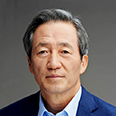Dr. Chung Mong Joon
Founder of the Asan Institute
It was with great sadness that I heard the passing of Dr. Kissinger. Dr. Kissinger is my old friend and mentor.
I wish Dr. Kissinger is resting in peace. I presume that he continues to be busy analyzing and writing about international politics in heaven.
For Americans, Dr. Kissinger was one of this country’s finest statesmen and scholars. In the struggle against Communism through the Cold War, his intellectual and policy contributions successfully guided the United States and the free world. His legacy continues to influence how the United States engages with the world today.
Dr. Kissinger is remembered and appreciated around the world. I would like to share with you a Korean perspective on the contributions that he made to peace and prosperity on the Korean Peninsula.
On June 25, 1950, North Korea started the Korean War. The United States led the United Nations forces of 16 member states to come to South Korea’s help in its darkest hour. In December 1950, a young World War Two veteran, Henry Kissinger, visited Korea. At the time, he was a graduate student at Harvard University. After his trip, he submitted two memos titled “U.S. Strategy” to Dr. William Elliot, political adviser to President Harry S. Truman, and Mr. Paul Nitze, Director of Policy Planning at the State Department. They served as the basic documents to understand and cope with communist provocations in the world.
I was born in the southern port city of Busan in 1951 during the Korean War. The Korean War dragged on for three years and claimed about one million South Korean lives. About 36,000 US soldiers made the ultimate sacrifices. As the inscription at the Korean War Veterans Memorial in Washington, D.C. reads, they “answered the call to defend a country they never knew and a people they never met.” Had it not been for the intervention of the United States, I would not be here today.
South Korea is now a vibrant democracy and free market economy. Many call it the Miracle of the Han River. It is an exemplary member of the liberal international order that the United States built.
I was fortunate to have the pleasure of knowing Dr. Kissinger for many years. In July 1985, he stopped by Seoul on his way to China to meet with my father, who was then the Chairman of the Federation of Korean Industries, to discuss Korea’s security and China’s future.
Over the years, we regularly visited each other. In 2006 when I was a Vice President of FIFA (Federation Internationale de Football Association), I invited Dr. Kissinger to several matches during the 2006 FIFA World Cup Germany. In January 2008, I visited the United States as President-elect Lee Myung-bak’s Special Envoy to meet President George W. Bush. I was fortunate to meet Dr. Kissinger during the visit in New York.
When I was a member of the South Korean National Assembly, I visited Washington, D.C. in December 2008 as the Chairman of the Grand National Party’s Special Committee on Korea-US Vision during the U.S. presidential transition period. I met with Dr. Kissinger and U.S. scholars.
When I returned to Washington the next month in January 2009. Dr. Kissinger invited me to the Alfalfa Club’s annual banquet, the gathering of 200 influential U.S. political and business leaders, where he introduced me to then President-elect Barack Obama.
The Asan Institute for Policy Studies invited Dr. Kissinger to deliver the first Memorial Lecture in March 2010, where he spoke on the North Korean nuclear threat and Northeast Asia’s future. He said to me that, “No country can defend every corner of the world at the same time. However, South Korea can trust the U.S. security commitment.”
I hosted a dinner for him in March 2012 in Seoul when he visited Korea as the leader of the Eminent Persons Group for the 2012 Nuclear Security Summit. In April 2013, he invited me to his home in New York and in August 2014 Dr. Kissinger and his wife Nancy invited me to their summer home in Connecticut.
In July 2015, Dr. Kissinger invited me once again to his New York home for a dinner attended by the Chairman of News Corporation Rupert Murdoch, former New York Mayor Michael Bloomberg, and former Wall Street Journal editor Karen House. In November 2019, we met again in New York where Dr. Kissinger stated that North Korea’s denuclearization is in China’s interest and that the role of the United States is important.
While it was difficult to meet Dr. Kissinger during the pandemic, I made a donation honoring his achievement and contribution to international peace and stability to the Henry A. Kissinger Center for Global Affairs at the Johns Hopkins University, School of Advanced International Studies (SAIS). I also donated to the Center for Strategic and International Studies (CSIS) to support a new Strategy and Statecraft Fellowship in his honor.
My last meeting with Dr. Kissinger was in January 2023 for lunch in New York. I was glad to see he was as energetic and active as ever. We exchanged views on the international situation and issues on the Korean Peninsula.
I appreciated his wise counsel on a wide range of issues facing the Korean Peninsula and the future of Asia. When the Asan Institute hosted its first major conference after the pandemic in June 2022 to celebrate the 140th anniversary of Korea-U.S. relations, Dr. Kissinger generously sent congratulatory remarks via video. When I asked Dr. Kissinger to deliver congratulatory remarks at the 2023 Asan Plenum in April, he again gladly agreed to do it. In his remarks, Dr. Kissinger said, “I believe that one fixed element that needs to be clear and unambiguous is the commitment by the United States to the defense of South Korea.”
Dr. Kissinger’s scholarly and intellectual achievements have influenced how people around the world view the United States and our world order. Dr. Kissinger’s realist scholarship on the balance of power and strategic equilibriums was particularly well-suited for Northeast Asia during the Cold War. It also remains prescient today. South Korea and 28,500 U.S. troops and their families continue to confront a totalitarian North Korean regime that represses its 24 million people and threatens the world with nuclear weapons. Dr. Kissinger knew that peace could be secured only through strength, not by wishful ideas.
He also recognized that it is sometimes necessary to pursue bold diplomacy with adversaries to advance our national interests when the opportunity arises. This was shown by his opening up of Communist China, détente and arms control with the Soviet Union, and brokering ceasefires in the Middle East.
We are here today to commemorate Dr. Kissinger’s lifelong service. We will always remember his wisdom and miss his insights as we continue to navigate a tumultuous world.
Image 1) Honorary Chairman M.J. Chung, serving as the Chairman of the Special Committee on the Korea-U.S. Vision within the Grand National Party at the time in 2008, met with Dr. Kissinger at the Center for Strategic and International Studies (CSIS)
during his visit to discuss issues regarding North Korea.
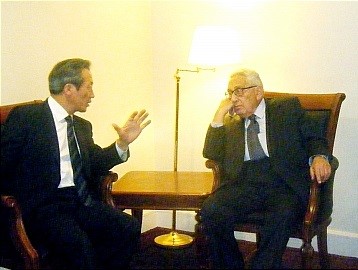
Image 2) In 2010, following an invitation from the Asan Institute for Policy Studies,
a Memorial Lecture was held, during which Honorary Chairman M.J. Chung had a meeting with Secretary of State Kissinger.
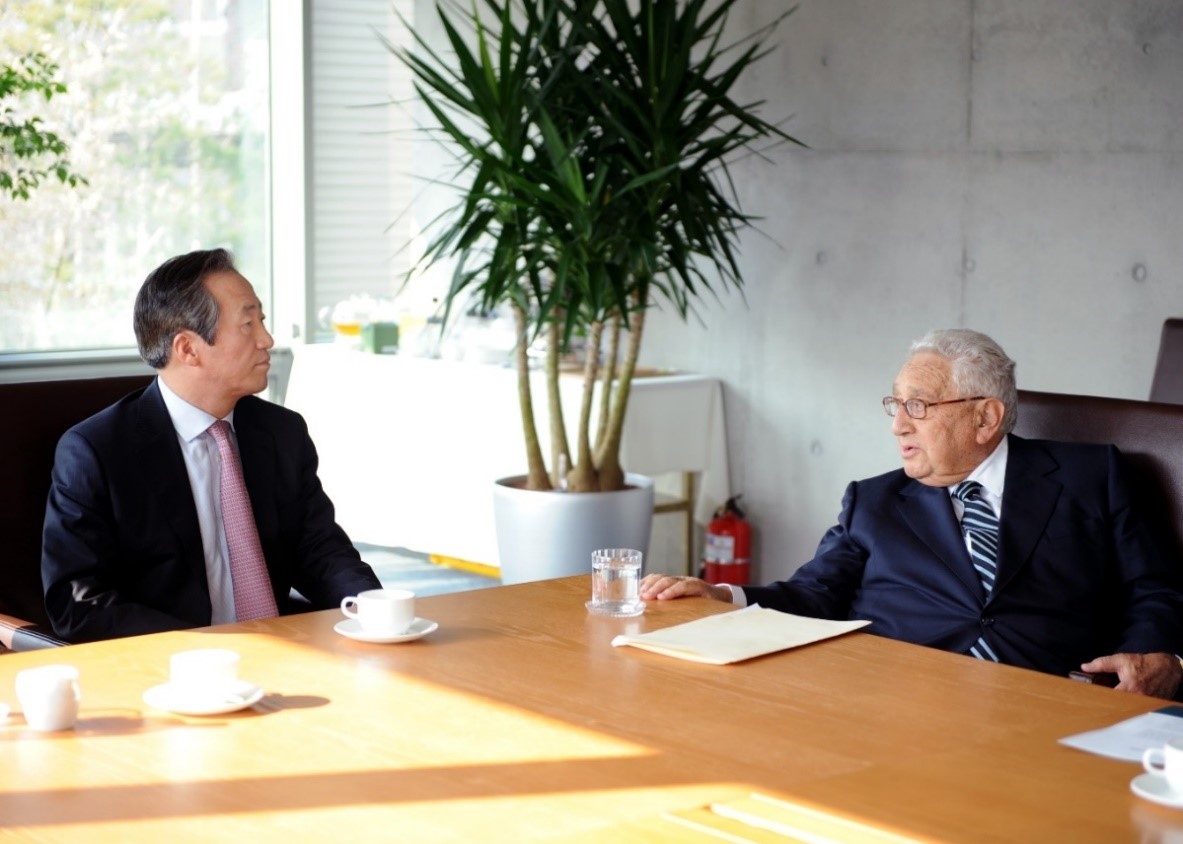
Image 3) In 2012, Honorary Chairman M.J. Chung invited Dr. Kissinger
to a dinner meeting at the Asan Yeong Bin Kwan, located in Seongbuk-dong.
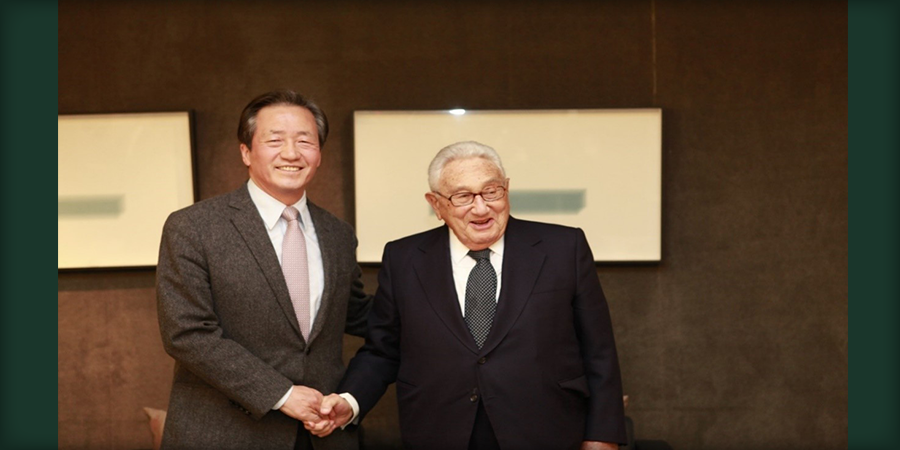
Image 4) In 2013, Dr. Kissinger hosted a dinner at his New York residence.
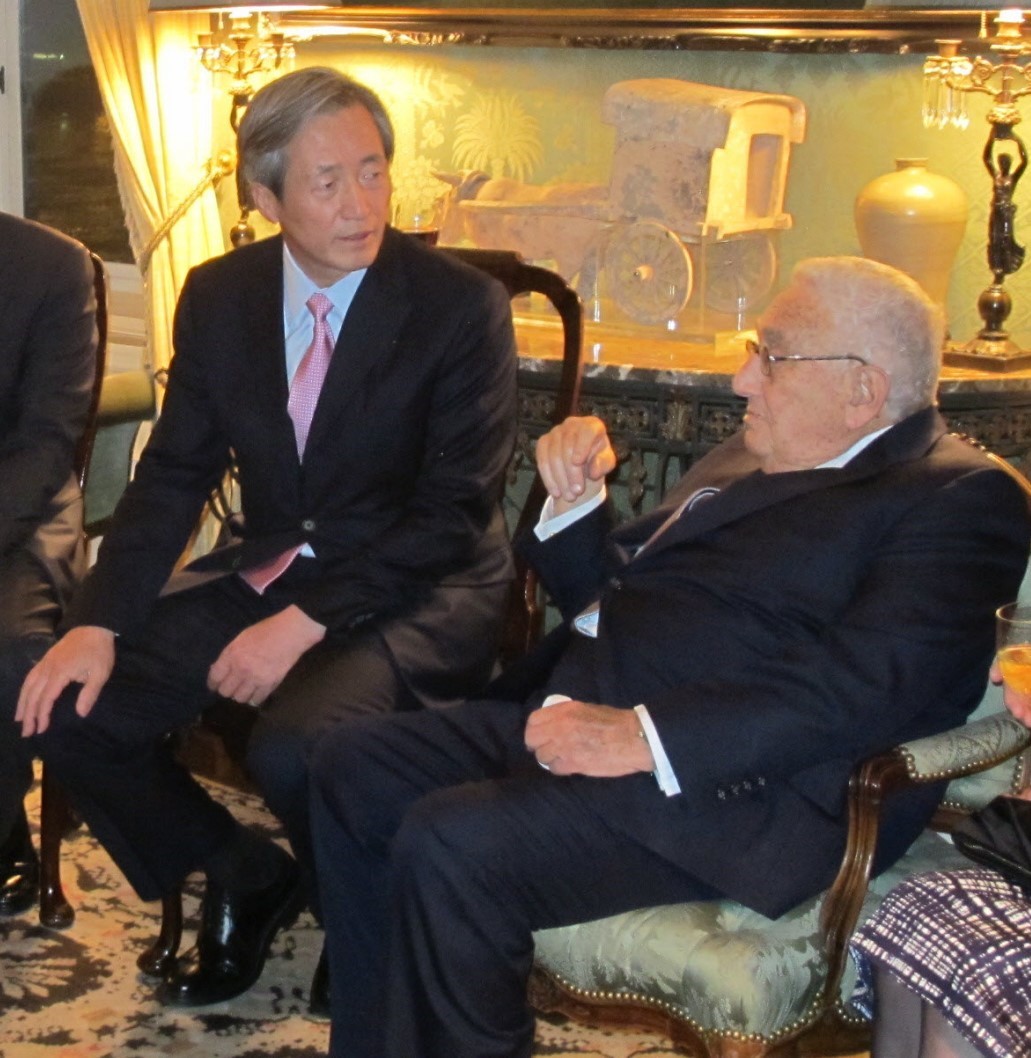
Image 5) In 2014, Honorary Chairman M.J. Chung was invited to the summer home in Connecticut by Secretary of State Kissinger and his wife.
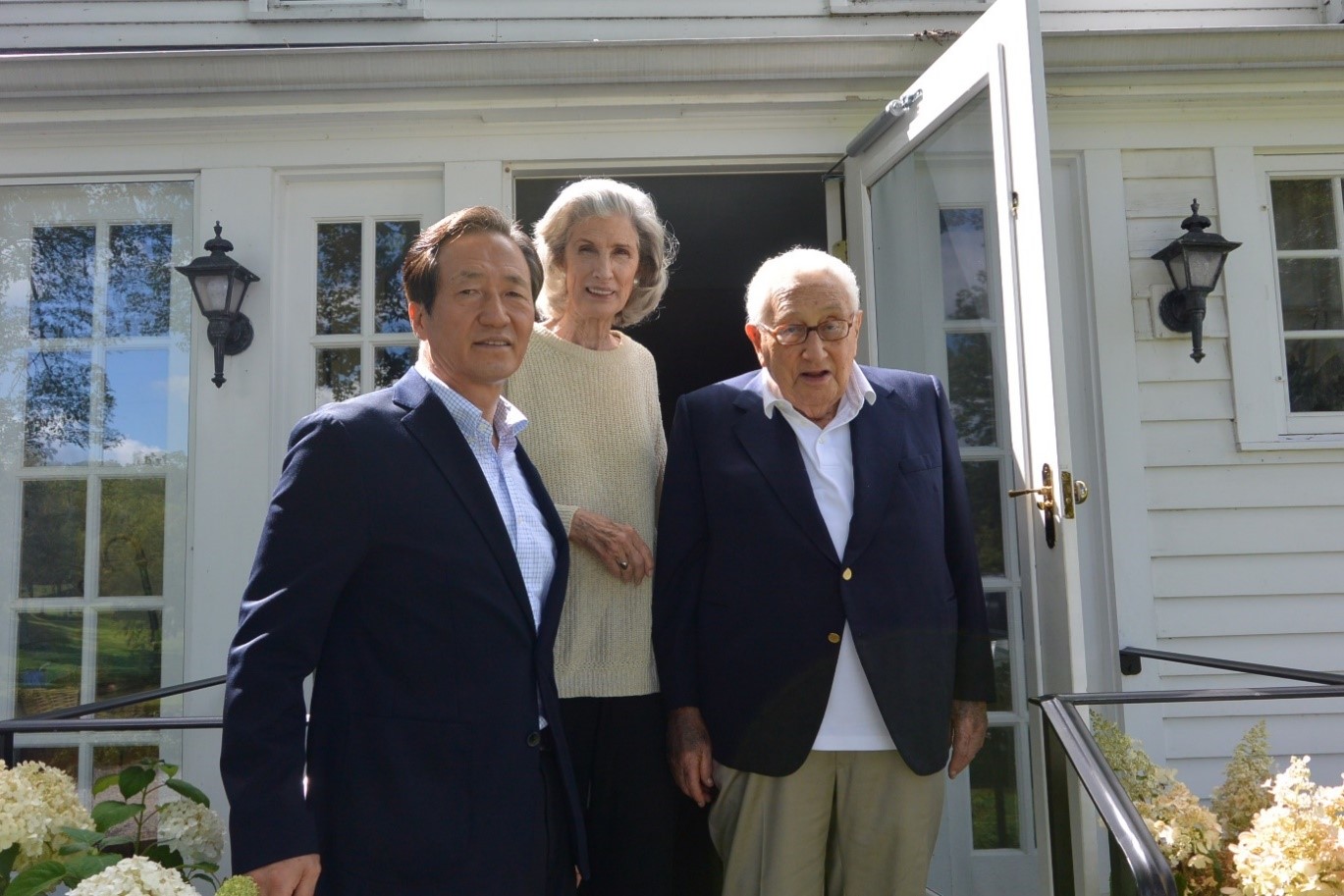
Image 6) In 2019, an exchange of views on U.S.-China relations and the North Korean nuclear issue took place at Secretary of State Kissinger’s residence.
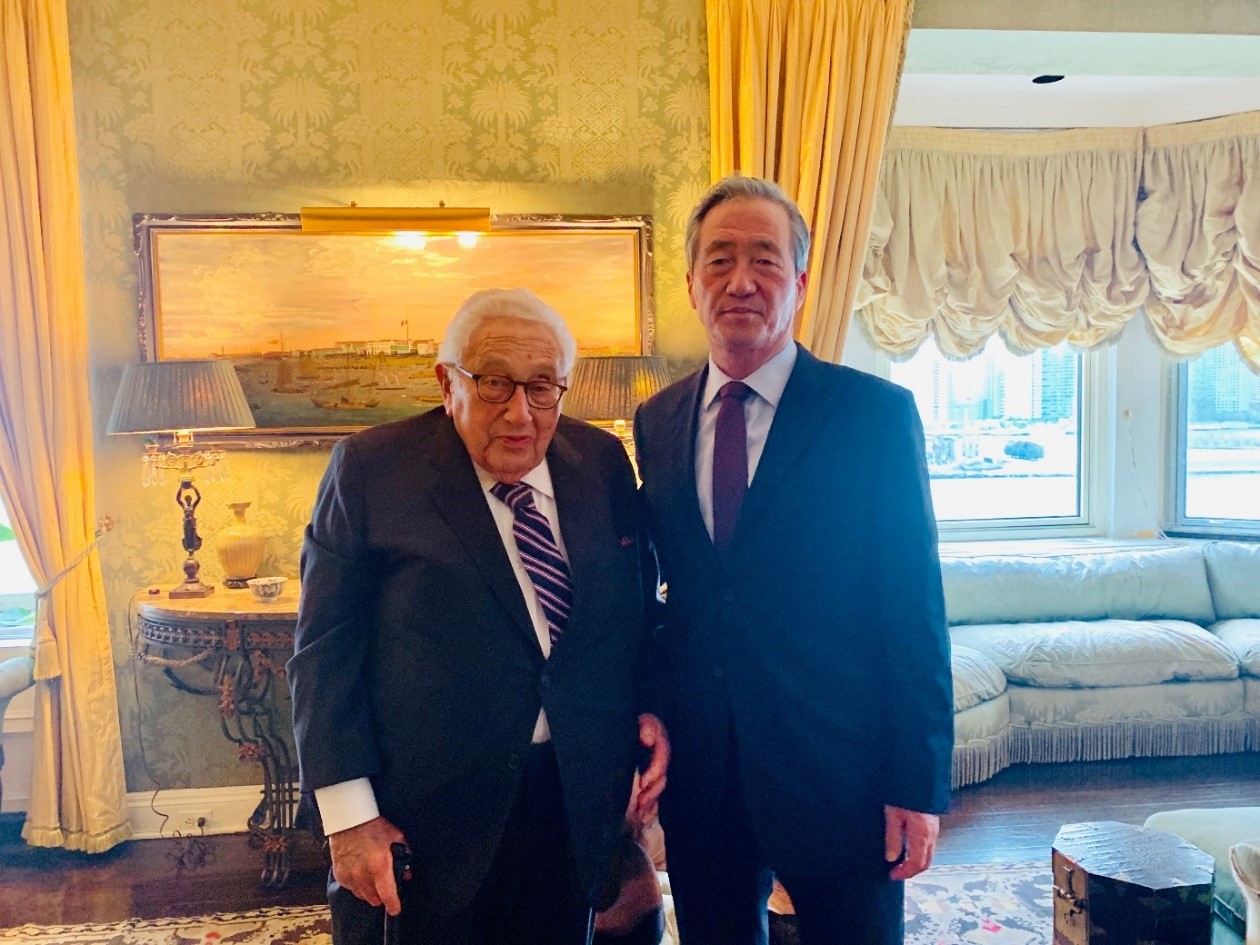
Image 7) In 2021, Honorary Chairman M.J. Chung conducted a video conference with Secretary of State Kissinger at the Asan Institute for Policy Studies.

Image 8) In 2023, Honorary Chairman M.J. Chung had a luncheon meeting with
Dr. Kissinger in New York.
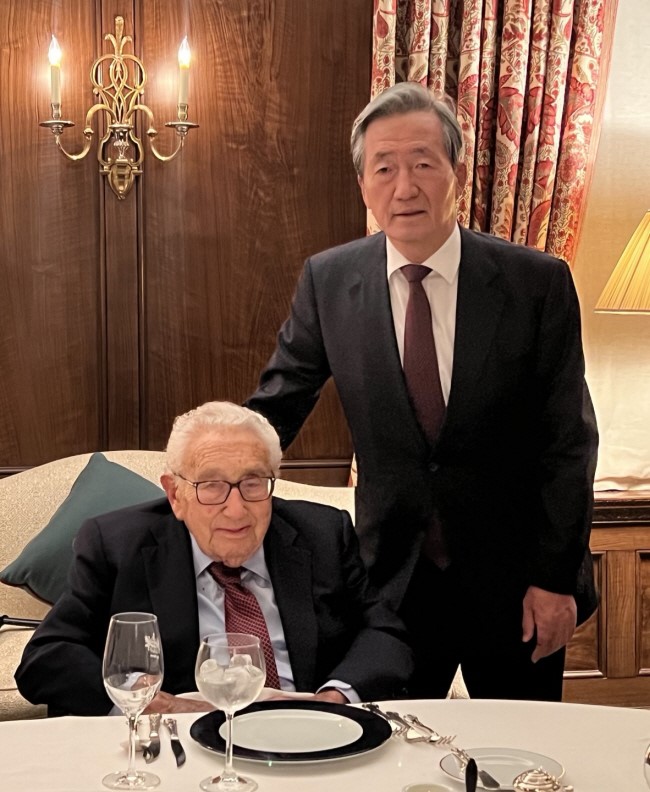

 Facebook
Facebook Twitter
Twitter